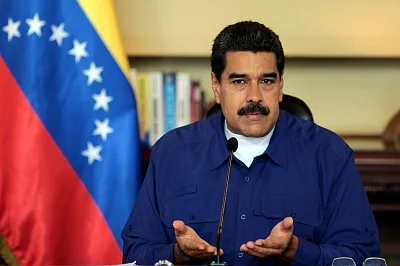Caracas, Feb 9 (IANS) Venezuelan President Nicolas Maduro criticised the European Union-backed International Contact Group on Venezuela as partisan but said he would be prepared to meet with its representatives.
"I'm ready and willing to receive any envoy from the contact group," Maduro said at a press conference at the Miraflores presidential palace on Friday.
The Venezuelan President, however, said he rejected the "partisan, ideological" lens through which its members view the oil-rich nation, Efe news reported.
The contact group, which is seeking to find a solution to Venezuela's political and economic crisis through dialogue and new presidential elections, is made up of major European countries including Germany, the United Kingdom, Spain and France, and a handful of Latin American countries such as Uruguay, Ecuador and Costa Rica.
Mexico participated at the group's inaugural meeting Thursday in Montevideo, but it did not sign a statement calling for new presidential elections as a means of resolving the deep divisions in Venezuela.
It says doing so would amount to interference in that country's internal affairs.
Leftist-led Bolivia also refuses to support snap presidential elections in Venezuela.
The US, Canada, numerous Latin American countries and the major European powers all consider Maduro's May 2018 re-election victory to be tainted by fraud and have even taken the step of recognizing the speaker of the opposition-controlled National Assembly, Juan Guaido, as interim president.
Guaido declared himself as Venezuela's legitimate leader during a mass opposition rally in Caracas on Jan 23.
Separately Friday, the US ambassador to Colombia, Kevin Whitaker, called on Venezuela's military to allow international humanitarian assistance to enter the country.
That aid is being assembled at a collection centre in Cucuta, a Colombian city on the border with Venezuela.
Whitaker said during Friday's inauguration of the centre that Venezuelan armed forces officers and troops had the opportunity to participate in a great, admirable humanitarian campaign that would help alleviate the severe problems of Venezuela, which is suffering from widespread shortages of food and medicine and hyperinflation.
Two large trucks and seven smaller ones carrying humanitarian aid provided by the US arrived Thursday at the Tienditas international bridge, one of three border crossings in Cucuta.
Whitaker said the aid shipments were authorized by the "interim president of Venezuela, Juan Guaido," and said that soldiers, as inhabitants of that South American nation, know better than anyone how urgent the situation is.
Maduro has thus far used the military to block the aid from entering Venezuela, denying that the country is suffering a humanitarian crisis and saying the delivery of the shipments would be a prelude to a US-led military intervention.
Colombia's government, for its part, said at Friday's inauguration in Cucuta that the joint operation being carried out with the US was a purely humanitarian initiative and that no military intervention was in the works.
US President Donald Trump's administration has imposed severe sanctions on Venezuela's oil industry (crude exports accounts for nearly all of the country's hard-currency income) and was first in line to recognize Guaido as interim president.
He said last month that "all options are on the table" in dealing with Maduro and has warned that leftist leader not to arrest Guaido.
The US embassy in Colombia said that the first phase of the aid deliveries would provide, among other supplies, 10 days of food assistance for more than 5,000 Venezuelans and emergency medical kits able to meet the needs of 10,000 people over a 90-day period.
--IANS
vin/
(This story was auto-published from a syndicated feed. No part of the story has been edited by The Quint.)
(At The Quint, we question everything. Play an active role in shaping our journalism by becoming a member today.)
